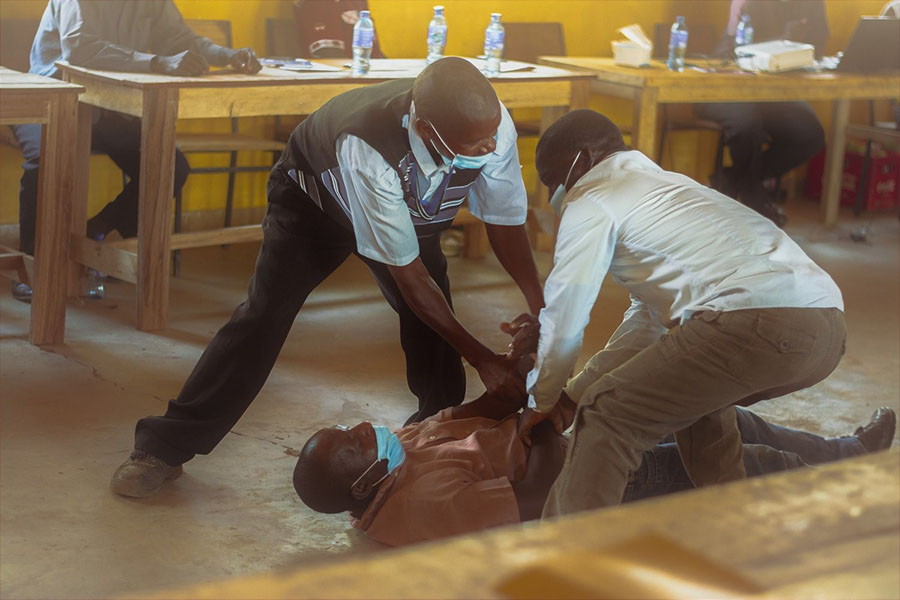Art & Global Health Center Africa (ArtGlo) and Reprieve are excited to launch a new series of radio plays, aiming to open conversation and reflection on the death penalty. The play will air on Thursdays at 6:30pm, on MBC Radio 1 starting on 4th November. If you miss an episode you can catch up here.
The story began with Human Rights NGO Reprieve’s work on the resentencing project in 2014. Before 2007, any person convicted of homicide was automatically sentenced to death. In 2007 the High Court of Malawi struck down the mandatory death penalty in the landmark decision of Kafantenyi v Attorney General. Following the Kafantenyi judgement, every individual given a mandatory death sentence was entitled to a resentencing hearing, where they could present mitigating evidence. In 2014, Reprieve, in coalition with ten other stakeholders, including the Malawi Legal Aid Board and the Malawi Human Rights Commission, launched the award-winning Malawi Resentencing Project to assist approximately 170 prisoners who were languishing in prison to receive a resentencing hearing. As a result of this project, the courts held over 158 hearings and reduced the sentences of every single prisoner. None were resentenced to death and 145 prisoners have since been released to their families and communities having served their new sentences.
Reprieve was keen to engage more people in Malawi in learning about the death penalty and its implications, and teamed up with Malawian participatory arts NGO, ArtGlo. ArtGlo worked with Reprieve to facilitate a series of workshops in all three regions of Malawi (South, Central and North). Bringing together traditional leaders, people who had been resentenced under the resentencing project, and other stakeholders, the workshops used the Malawian ‘Umunthu’ philosophy as an entry point to explore perspectives on punishment and the death penalty. Through a series of arts-based activities, participants shared their perspectives on the death penalty, and the purpose of punishment. A major theme that came out from the workshops was around the purpose of punishment from the perspective of Umunthu being to reform the perpetrator, and that the death penalty takes away this possibility. One participant from Machinga commented that “Punishments should be given but in an Umunthu way so that they should learn a lesson.” They also discussed how the death penalty seals evidence, making it impossible to get more information from the convict, and how poor people who can’t afford expensive legal fees are more likely to receive harsh sentences.
Participants also had a chance to hear the story of a former death row convict who been resentenced and re-integrated, several of whom have shown their capacity to reform and contribute to the community. Mr Francisco James, who had previously been on death row before being re-sentenced, is one such individual. He has turned his life around and is doing so well. He grows tobacco and he is currently building the first ever bigger modern house in his village. “When I was in prison I spent most of my time planning my life if I were to be released. I designed my house while in there. Upon being released, I started rolling out my plans and here I am.” He said. He also related how he is also using his experience to counsel youths in his village against bad conduct that can lead them to prison. “I tell everyone my story on how I ended up on the wrong side of the law and I encourage them to do and be better. I do not want them to go through what I went through myself” he said, “it was a horrible experience, one I wouldn’t even wish on my worst enemy.”
ArtGlo’s team then used narratives to the workshop, alongside testimonials from resentencing beneficiaries and their families to develop a series of radio plays weaving together some of the themes and experiences that came out. They worked closely with Reprieve’s team on developing the plot and story line, to ensure it reflects issues they are seeing in real life in their work on the Resentencing project.
The death penalty has received more attention in Malawi over recent months. In April, the Supreme Court declared the death penalty unconstitutional in Khoviwa v the Republic. Justice Dunstan Mwaungulu stated in his judgement that Malawi’s constitution respects the right to life – and said the death penalty negates that right. Justice Mwaungulu also ordered the re-sentencing of all cases where the death penalty was handed down. However, in August, the Supreme Court revised the original judgement to remove the abolition of the death penalty, due to a procedural technicality. Whilst the death penalty still technically stands, the positive public reaction to the initial judgement which appeared to abolish the death penalty, has led many politicians to call for abolition. The Parliamentary Legal Affairs Committee has recently called for the abolition for the death penalty, stating it is ready to start the process of bringing a bill before Parliament.
With this fluctuating context, it is an important time for Malawians to open discussion on the death penalty and its implication. The play’s Chichewa title, Tionenso, loosely translates as ‘let’s review/ let’s discuss’, reflecting this invitation to open discussion, and listeners will have a chance to share their views in response to questions posed after the plays by WhatsApp or SMS.



